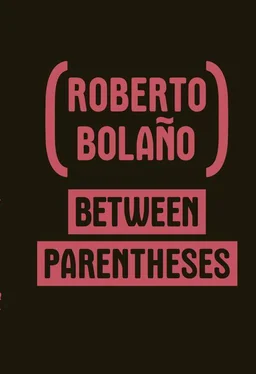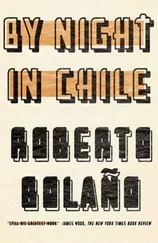Roberto Bolaño - Between Parentheses - Essays, Articles and Speeches, 1998-2003
Здесь есть возможность читать онлайн «Roberto Bolaño - Between Parentheses - Essays, Articles and Speeches, 1998-2003» весь текст электронной книги совершенно бесплатно (целиком полную версию без сокращений). В некоторых случаях можно слушать аудио, скачать через торрент в формате fb2 и присутствует краткое содержание. Год выпуска: 2011, Издательство: New Directions, Жанр: Публицистика, Критика, на английском языке. Описание произведения, (предисловие) а так же отзывы посетителей доступны на портале библиотеки ЛибКат.
- Название:Between Parentheses: Essays, Articles and Speeches, 1998-2003
- Автор:
- Издательство:New Directions
- Жанр:
- Год:2011
- ISBN:нет данных
- Рейтинг книги:4 / 5. Голосов: 1
-
Избранное:Добавить в избранное
- Отзывы:
-
Ваша оценка:
- 80
- 1
- 2
- 3
- 4
- 5
Between Parentheses: Essays, Articles and Speeches, 1998-2003: краткое содержание, описание и аннотация
Предлагаем к чтению аннотацию, описание, краткое содержание или предисловие (зависит от того, что написал сам автор книги «Between Parentheses: Essays, Articles and Speeches, 1998-2003»). Если вы не нашли необходимую информацию о книге — напишите в комментариях, мы постараемся отыскать её.
The Savage Detectives
Between Parenthese
Between Parentheses: Essays, Articles and Speeches, 1998-2003 — читать онлайн бесплатно полную книгу (весь текст) целиком
Ниже представлен текст книги, разбитый по страницам. Система сохранения места последней прочитанной страницы, позволяет с удобством читать онлайн бесплатно книгу «Between Parentheses: Essays, Articles and Speeches, 1998-2003», без необходимости каждый раз заново искать на чём Вы остановились. Поставьте закладку, и сможете в любой момент перейти на страницу, на которой закончили чтение.
Интервал:
Закладка:
When I was young, in Mexico City, we played a game in which we divided ourselves into champions of the trobar leu and the trobar clus . The trobar leu was, of course, the light song, simple and intelligible to everyone. The trobar clus , by contrast, was dark and opaque, formally complex. Despite its conceptual richness, however, the trobar clus could often be more violent and brutal than the trobar leu (which was generally delicate), like Góngora written by a convict, or more precisely, like foreshadowings of Villon’s black star.
Because we were young and ignorant, we didn’t know that the trobar clus could in turn be divided into two categories, the trobar clus properly speaking, and the trobar ric , which as its name indicates is sumptuous verse, full of flourishes, and generally empty. In other words: the trobar clus trapped in the halls of academe or the court, the trobar clus stripped of the vertigo of words and life. We knew that without the troubadours the Italian dolce stil novo would never have existed, and accordingly that without the dolce stil novo there would be no Dante, but what we liked best were the misspent lives of some of the troubadours. For example: Jaufre Rudel, who fell in love literally by hearsay with a countess who lived in Tripoli, crossed the Mediterranean on what amounted to a crusade in search of her, got sick, and finally ended his days in a Tripoli boarding house, where the countess, aware that here was a man who had celebrated her in many songs and poems, came and permitted Rudel — who now awaited only death — to rest his head in her lap.
I don’t know what they have to say to us today, the troubadours. So far away in their twelfth century, they seem naïve. But I wouldn’t be too sure about that. I know they invented love, and they also invented or reinvented the pride of being a writer, of gazing fearlessly into the depths.
HERRALDE
Editors tend to be bad people. Not to mention critics and the readers at publishing houses and the thousands of lackeys who travel the dim or brightly lit corridors of publishing houses. But writers are often worse, among other things because they believe in lasting glory or in a world ruled by Darwinian laws or maybe because lurking in their innermost souls is a slavishness even more base.
I’ve had the misfortune of meeting a number of editors who were a burden to their own mothers and I’ve also been lucky enough to meet several, maybe seven or eight, who were and are responsible people, rather gloomy (melancholy is a mark of the trade), intelligent, with guts to spare and a sense of humor, editors who’re determined, for example, to publish authors and books that they know from the start will sell very few copies.
A little while ago the second Targa d’Argento Prize was awarded to the best European publisher, and the recipient was my editor, Jorge Herralde, who beat out many other editors, some about to be wreathed or already wreathed in an aura of legend. Now Herralde has written this book, Opiniones mohicanas [Mohican Opinions] (2001), published by El Acantilado, the house of another remarkable editor and writer, Jaume Vallcorba. To read this book, a collection of assorted pieces and jottings scarcely twenty lines long, is to plunge into the recent history of the Barcelona publishing industry and the European and Latin American publishing world, as well as to step into the circle of Herralde’s friends, his editorial battles, and the political changes undergone in Spain since the end of the dictatorship.
All kinds of writers parade across its pages. Bukowski, whom Herralde and Lali Gubern visit in California. Patricia Highsmith, with whom they dine in Madrid, along with the mayor Tierno Galván. Carlos Monsiváis, the great Sergio Pitol, Carlos Barral, whose ghost is still bowed by the shame of having rejected One Hundred Years of Solitude . Soledad Puértolas, Carmen Martín Gaite, Esther Tusquets, Belén Gopegui — probably the best four women prose writers in Spain. Not to mention a host of British, French, Italian, and American writers, as well as some Latin Americans and Catalans.
What can I say about Herralde that no one, not even Herralde, can later hold against me? I could say that his prose is elegant and ironic, like Herralde himself. But that’s not saying much. What I should really say is that once, during a trip that I made in the grips of the most extreme paranoia, when I reached my destination I discovered several faxes from Herralde at my hotel, in which he told me not to worry and offered all the means at his disposal to get me out of the country at a moment’s notice in case my paranoia should grow more acute.
I also remember another time, at his office, when — after I told him I didn’t plan to attend a party to which I had been invited because I didn’t know the order in which to use the five forks, six spoons, and four knives sure to be standing guard next to my plate — Herralde very patiently explained to me the specific use of each piece of cutlery and the pace of usage or non-usage of the objects in question. It goes without saying that as Herralde explained all this I stared at him in a mixture of confusion, awe, and rage. In this sense Herralde is a proud son of the Catalan bourgeoisie, that cultivated and in no way cowardly bourgeoisie which is vanishing by leaps and bounds.
And what else can I say about him? That literature in the Spanish language wouldn’t be the same if Anagrama had never existed, and that if I ever leave the publishing house (home to seven of my books), I’ll probably especially miss Lali Gubern, Teresa, Ana Jornet, Noemí, Emma, Marta, Izaskun, and sweet María Cortés, now retired, among all the other pretty (and smart) girls who work there, but I’ll also miss Herralde, the interminable afternoons spent arguing about advances, his brief and always pithy remarks, his devastating opinions, lunches at El Tragaluz and dinners at Il Giardinetto, more devastating opinions, more clashing memories from different perspectives — and his independence as chief of the unvanquishable Mohicans.
SPECULATIONS ON A REMARK BY BRETON
A while ago, in an interview I can’t find now, André Breton said that the time might have come for surrealism to go underground. Only there, thought Breton, could it survive and prepare itself for future challenges. He said this toward the end of his life, in the early ’60s.
The suggestion, attractive and ambiguous, was never repeated, either by Breton in the many interviews he later gave or by his surrealist disciples, busy directing terrible films or editing literary magazines that by this point had little or nothing to contribute to literature or to the revolution that Breton and his early comrades saw as something convulsive and vague, that familiar amorphous thing.
It always seemed strange to me that a veil should have been drawn over this strategic possibility, if we can call it that. It raises a number of questions, in my opinion. Did surrealism really go into hiding, and did it die there, in the sewers? Did just a part of it — the least visible part, the young people, for example — go underground while the old guard covered the retreat with exquisite corpses and found objects, thereby making it seem as if all had fallen silent when in fact a retrenchment was taking place? What did this underground branch of surrealism become after 1965, a year before Breton’s death? How involved was it, along with the situationists, in May 1968? Was there an operational underground movement during the last thirty years of the twentieth century? And if there was, how did it evolve, what did it achieve in the fields of fine arts, literature, architecture, film? What was its relationship with official surrealism, in other words the surrealism of the widows, the cinephiles, and Alain Jouffroy? Did any of these subgroups maintain contact with the surrealists in hiding? Was the area of operations of this underground surrealism limited to Europe and the United States or were there also Asian, African, Latin American branches? Could the underground surrealists have split, in time, into subgroups, first at odds with one another and then lost like wandering tribes in the desert? Might they have forgotten, in a relatively short time, that they were actually underground surrealists? And how are the new underground surrealists recruited? Who calls them at midnight and informs them that from now on they can consider themselves part of the group? And what do the people who get the calls think? That they’ve fallen prey to a joke, that the voice with the French accent is really the voice of some practical joker of a friend, that they’re hearing things? And what orders do the new underground surrealists receive? To hurry up and learn to read and speak French? To report to a place in Paris where someone will be waiting for them? Not to be afraid? Above all: Not to be afraid? And what if that place is a cemetery, one of the many legendary cemeteries of Paris, or a church or a bourgeois house on a bourgeois street? And what if it’s a basement located in the darkest corner of the Arab quarter? Should the new underground surrealist — who on top of everything isn’t entirely sure he’s not the victim of a prank that’s gone on too long — report for duty?
Читать дальшеИнтервал:
Закладка:
Похожие книги на «Between Parentheses: Essays, Articles and Speeches, 1998-2003»
Представляем Вашему вниманию похожие книги на «Between Parentheses: Essays, Articles and Speeches, 1998-2003» списком для выбора. Мы отобрали схожую по названию и смыслу литературу в надежде предоставить читателям больше вариантов отыскать новые, интересные, ещё непрочитанные произведения.
Обсуждение, отзывы о книге «Between Parentheses: Essays, Articles and Speeches, 1998-2003» и просто собственные мнения читателей. Оставьте ваши комментарии, напишите, что Вы думаете о произведении, его смысле или главных героях. Укажите что конкретно понравилось, а что нет, и почему Вы так считаете.












